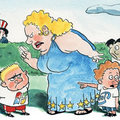| |
 | |
FRANÇOIS-HENRI PINAULT is defying predictions. As the son of François Pinault, one of France's richest and most controversial businessmen, he was generally assumed to be a fils à papa, the son of a powerful father whose main qualification was his surname. But since 2005, when he took over as boss of PPR, the conglomerate in which his family owns a 32% stake, he has proved more hands-on than expected: he replaced most of the senior staff and sold a chunk of Fnac, a media group, as well as Orcanta, a lingerie brand, and Printemps, a chain of department stores that had been the second ‘P’ in PPR.
On April 10th Pinault fils announced the biggest deal of his career so far. PPR has bought 27% of Puma, a German sportswear firm, and is offering to purchase the rest. The offer, which values Puma at €5.3 billion ($7.1 billion), will be financed entirely by debt. Jochen Zeitz, boss of Puma, endorsed the bid to shareholders at Puma's general meeting on April 11th in Nuremberg. At the same meeting, PPR won three seats on Puma's board.
PPR's pounce for Puma came as a surprise. Last year Mr Pinault had eyed Bulgari, an Italian luxury-goods company (see article) and other jewellers and fashion designers in Italy and France to beef up the luxury arm of his retail-cum-luxury empire. At the time he said he would like the group to focus more on lucrative luxury goods.
Yet after an unprecedented boom in the industry, makers of luxury goods are much in demand. Bulgari would have been very expensive. Chanel, Hermès and Armani are not for sale. So Mr Pinault set his sights eastwards. He has known Mr Zeitz since 2004, when he tried to lure him away from Puma to become chief executive of Gucci group, which owns most of PPR's luxury brands. Mr Zeitz is one of corporate Germany's shooting stars. After becoming the youngest boss of a publicly listed German company when he took over Puma in 1993, he transformed the firm from a near-bankrupt plimsoll-maker into a trendy high-street brand.
Mr Pinault and Mr Zeitz, who are both the same age, get along well. Mr Pinault wants Mr Zeitz and his team to keep their jobs. The headquarters of the company will remain in Herzogenaurach, a tiny town in southern Germany. Alexander McQueen, one of the Gucci group's acclaimed designers, has been making shoes for Puma since 2005. Other designers in the Gucci stable may also lend a hand to Puma. Price was the main sticking point during the talks, and PPR seems to have secured a good deal. Analysts say it will need to increase its offer to buy the entire company. Nike, an American sportswear firm, could launch a rival bid, though PPR's stake is a strong deterrent.
“It is a good deal for PPR financially and in terms of strategy,” says Marc Festa, an analyst at Exane, a French broker. It adds a third strand to the group's business, somewhere between its profitable but volatile luxury interests and its steadier but less lucrative retail division. Puma stands to benefit too: PPR will bring know-how in retail, brand management and e-commerce. Only 16% of Puma's kit was sold in its own shops last year. Mr Pinault wants to help Puma raise this figure by building more “concept” stores.
Mr Pinault will probably sell more of his retail businesses to pay off the debt PPR is about to raise to buy Puma. More of Fnac or Conforama, a household-furnishing retailer, could be put up for sale. YSL Beauté, the poorly performing perfume and cosmetics subsidiary of Yves Saint Laurent, one of Gucci's fashion brands, is likely to be on the block soon. At present, the group's debt stands at €2.9 billion, which would increase to more than €8 billion after a takeover of Puma. Standard & Poor's, a rating agency, said it was reviewing PPR's creditworthiness after the announcement of the Puma deal. PPR will be keen to avoid a downgrade. So in the course of the year Mr Pinault is likely to shake up the group his father founded quite a bit more—and perhaps replace the missing ‘P’.





